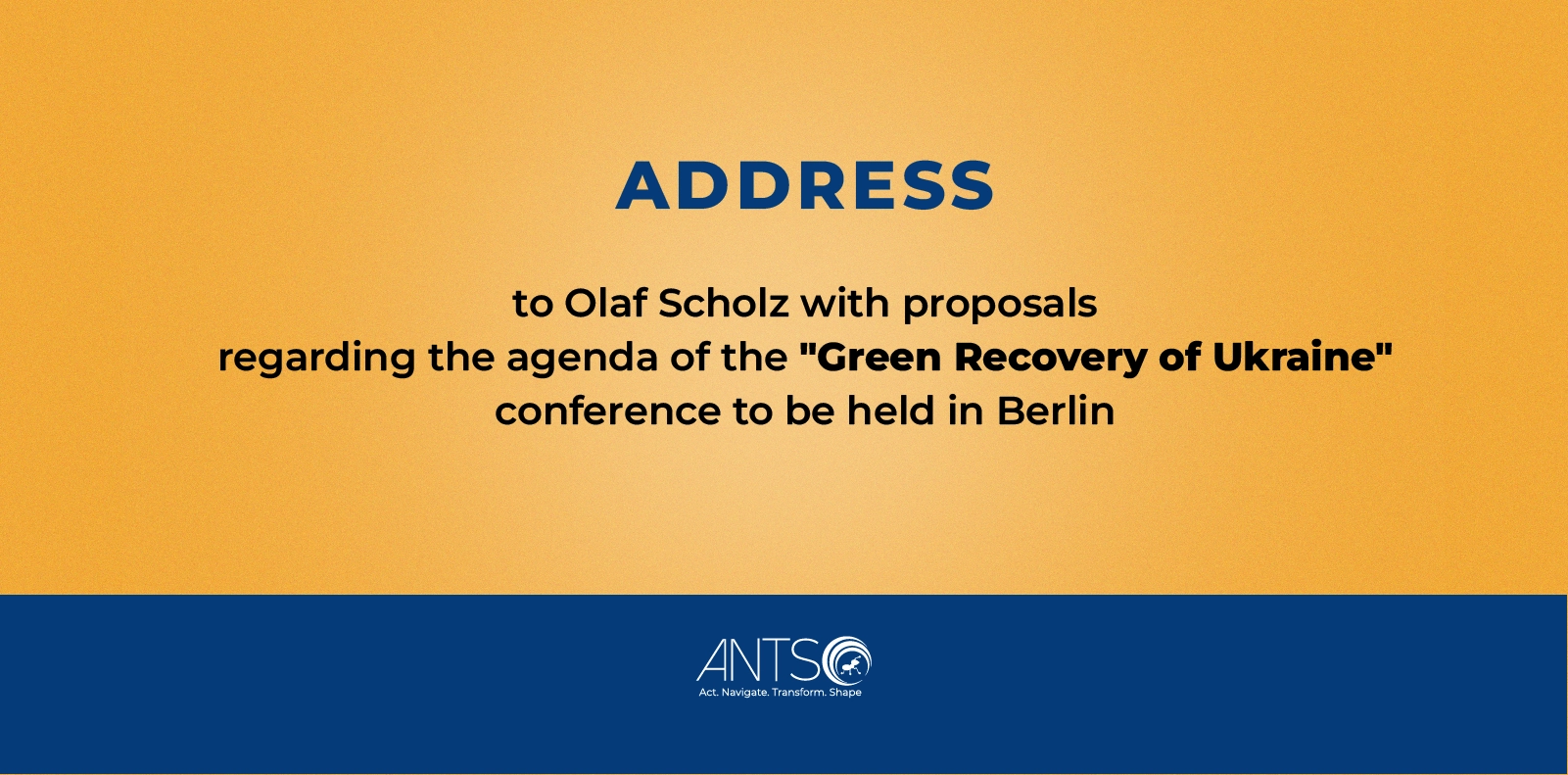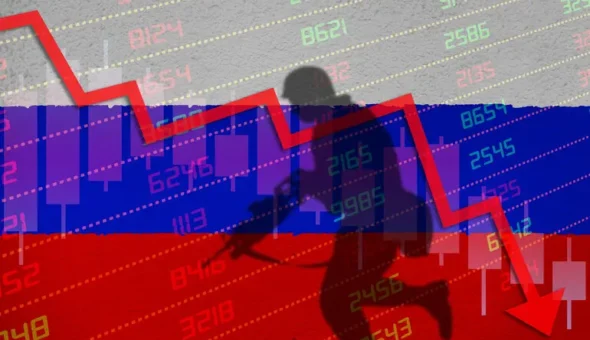
Federal Minister for Economic Cooperation and Development
Ms.Schulze
Stresemannstraße 94
10963 Berlin
info@bmz.bund.de
Copy:
Federal Chancellor
Mr. Olaf Scholz
Bundeskanzleramt
Willy-Brandt-Straße 1
105557 Berlin
Ukraine’s environment is suffering unprecedented damage as a result of Russia’s aggression, which poses threats to all of Europe and even the world, since the environment knows no borders. As a result of military actions, there is the destruction of industrial facilities – oil depots, plants, factories, warehouses, mines, infrastructure facilities – water pipelines, gas pipelines, water purification stations, water supply stations, the destruction of numerous buildings, which is accompanied by powerful fires, emissions of dangerous substances into the atmosphere, spills of fuel and lubricants, river contamination by untreated sewage into rivers. All this leads to the pollution of water, atmosphere, soil, and has become and will become the cause of numerous diseases and severe environmental pollution. Obviously, there is no way that such a significant impact on human health and life and environmental safety can be neglected in the recovery process. Unfortunately, every day of the war increases the destruction of the environment, so an important condition for reducing this damage is stopping russian aggression. We are very grateful to Germany, which is helping to stop this aggression by providing Ukraine with arms, ammunition and economic sanctions against russia.
The EU and the Ukrainian government supported the principles of building back better and building back greener as we are to use in the best way possible the development opportunity gained at such a high price. Green transition implies integration of environmental aspects into all sectors of development and production, transition to the circular economy, and this is possible only if the whole system of environmental governance is profoundly reformed.
In light of the launch of the negotiation process on Ukraine’s accession to the EU and approval by the European Commission of the “Ukraine 2023 Report”, representatives of Ukrainian civil society are convinced that further environmental reforms should not only be carried out, but also implemented fully in accordance with the recommendations of the European Commission and the principles of circular economy.
Ukraine has a historic chance to defend justice and finally and irrevocably gain its independence for future generations. Likewise, Ukraine has a unique chance to become a trend-setter by becoming a bright and successful example of correct environmental restoration according to the most progressive principles of sustainable development, in order to guarantee a healthy and safe environment for its citizens.
The restoration of Ukraine in accordance with the principles of the European Green Deal can become a model for imitation, just as the entire Ukrainian nation has become an example of unprecedented determination, indomitability, courage and zeal in winning back its freedom. The prerequisite for the green recovery of Ukraine is implementation of key environmental reforms, which are designed to create an effective model of environmental governance in Ukraine, which will ensure the proper state of the environment and guarantee compliance with the environmental rights of Ukrainians.
Therefore, we advocate the following reforms (topics) that should also be included into the agenda of the Ukraine Recovery Conference:
1. Horizontal environmental reforms:
- Reset of environmental monitoring system to effectively meet the information needs of environmental governance and create a good foundation for managerial decisions. Environmental standards for monitoring and quality, in contrast to the standardization of the permissible impact on environmental components, should define monitoring methods and relevant requirements for the quality of soil, air, water and the environment as a whole. The ultimate goal is to ensure a safe and desirable state of the environment. Restoration of infrastructure and industrial facilities should be based on the use of the best available technologies and management methods.
- Reset of state environmental control to stimulate compliance with environmental norms and improvement of the state of environment. This reform envisages empowerment of environmental control bodies with necessary scope of powers, strengthening environmental control measures.
- Modernization of the system of legal liability for violations of environmental norms that envisages expansion of the current set of environmental violations,criminal responsibility of legal entities for environmental crimes, introduction of preventive actions.
2. Sectoral environmental reforms:
- Pollution Prevention and Control. Reduction and control of industrial emissions. Implementation of Directive 75/2010/EU: Adoption of the law on industrial pollution and mandatory continuous monitoring of data on atmospheric emissions. Integrated approach to management of industrial emissions, introduction of integrated environmental permit.
- Waste management reform. The war brought new challenges to this sector, particularly in the context of recovery needs. There is a need to develop new strategies of dealing with demolition waste, military waste, and destruction waste.
- Biodiversity conservation. Adoption of the law on creation of the Natura2000 network. Creation of a separate public authority to deal with biodiversity conservation, particularly in the conditions of war and post-war recovery when many natural resources are to be used for rebuilding needs.
- Forest management and land preservation are currently viewed from the point of view of war-driven problems such as chemical contamination of lands, mined territories, burned forests.
- Transparency and accountability in the subsoil mining sector. Mineral resources, primarily critical minerals, are important for reconstruction needs but it is also vital to ensure transparency, accountability and public participation in decision-making regarding use of these resources in order to ensure compliance with the principles of sustainable development, preservation of valuable natural territories and biodiversity.
3. Critical raw materials (strategic minerals) – from environmental standards, high technologies and economic growth in communities to strengthening democracy.
Moreover, we would like to emphasize the importance of adhering to European environmental assessment tools for Ukraine’s restoration. The use of strategic environmental assessment (SEA) of plans and programs related to restoration and rebuilding is crucial, and environmental impact assessment (EIA) of planned activities should be the safeguards for sustainable and green recovery of Ukraine. Weakening or even temporary repeal of environmental legislation in wartime or in conditions of post-war reconstruction is unacceptable.
Also, as a consortium working to promote environmental democracy in Ukraine, we find it important to emphasize the role of local self-government, transparency, involvement of the public and communities into decision-making. Important documents, such as strategies or plans for post-war reconstruction, should be developed with the active participation and involvement of all stakeholders, including local governments and civil society organizations. Decisions, strategies and action plans must be adopted on a subsidiary basis (“Bottom up”), contributing to the further development of successful decentralization reform. Local governments need to be leaders in their communities and have a sense of ownership of community recovery processes. The achievements of the public, initiatives and analytics should be considered and taken into account in decision-making.
In view of the above, we believe it is vitally important that the Ukraine recovery conference has a separate track devoted to the environmental dimension of the recovery process and transition to the circular economy. We propose the following tentative agenda for the environmental track:
Block 1. Good environmental governance in Ukraine through reformation of environmental control, environmental monitoring and liability for environmental violations.
Block 2. Decreasing industrial emissions and implementing the principles “building back better” through the shift to energy-efficient, carbon-neutral and clean production.
Block 3. European-style waste management facilitating a shift to a circular economy.
Block 4. When recovering, do not harm biodiversity.
Block 5. Recovering forests and lands – how to deal with war-driven challenges.
Block 6. Critical raw materials (strategic minerals) – from environmental standards, high technologies and economic growth in communities to strengthening democracy.
We believe that Germany can play a key role in the reconstruction of our country, and we see the upcoming Conference on the Reconstruction of Ukraine in Berlin as a key opportunity to truly empower civil society, including highlighting current environmental needs, assessments, lessons learned, and recommendations. We are open for further discussion of outlined issues in any format convenient for you.
Best Regards
Iryna Chernysh, SaveDnipro NGO
Olena Kravchenko, Director of ICO “Environment People Law”
Hanna Hopko, Head of National Interests Advocacy Network “ANTS” NGO
Daria Kaleniuk, NGO Anti-Corruption Action Center (AntAC)more rigid responsibility for environmental violations, criminal responsibility of legal entities for environmental crimes, introduction of preventive actions.
Application in the format of the document by link.



